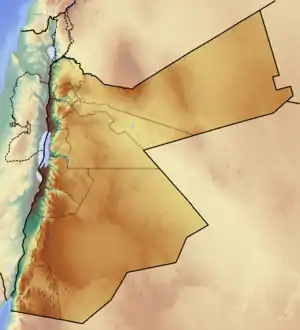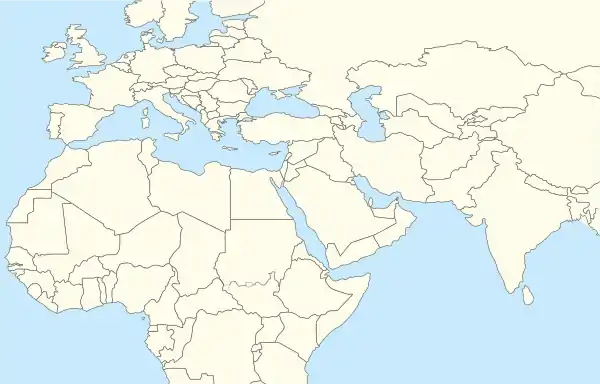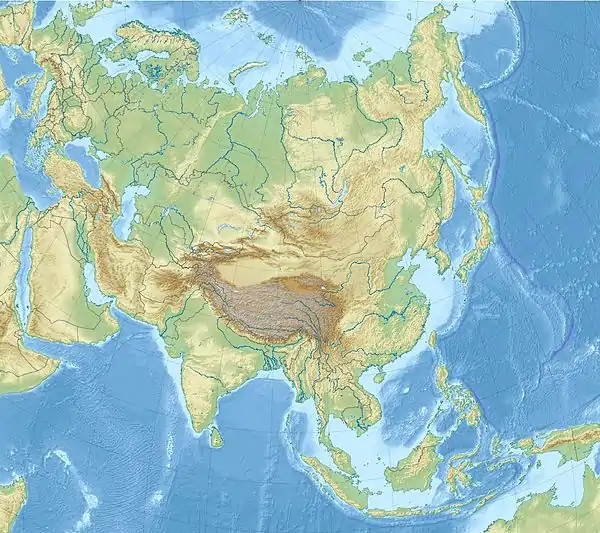Abarim
Abarim (Hebrew: הָעֲבָרִים, romanized: Hā-Avārīm)[1][2] is a mountain range across Jordan, to the east and south-east of the Dead Sea, extending from Mount Nebo — its highest point — in the north, perhaps to the Arabian desert in the south.
| Abarim | |
|---|---|
 Madaba Hills from Mount Nebo at sunrise | |
| Highest point | |
| Elevation | 710 m (2,330 ft) |
| Naming | |
| Native name | הָעֲבָרִים (Hebrew) |
| Geography | |
| Range coordinates | |
Etymology and description
According to Cheyne and Black, its Hebrew meaning is "'Those-on-the-other-side'—i.e., of the Jordan."[3] The Vulgate (Deuteronomy 32:49) gives its etymological meaning as passages.[4] Its northern part was called Pisgah, and the highest peak of Pisgah was Mount Nebo (Numbers 23:14; 27:12; 21:20; 32:47; Deuteronomy 3:27; 34:1; 32:49).
These mountains are mentioned several times in the Bible:
- Balaam blessed Israel the second time from the top of Mount Pisgah (Numbers 23:14)
- From "the top of Pisgah" i.e. Mount Nebo, an area which belonged to Moab, Moses surveyed the Promised Land (Numbers 27:12 and Deuteronomy 3:27; 32:49), and there he died (34:1,5)
- The Israelites had one of their encampments in the mountains of Abarim (Numbers 33:47,48) after crossing the Arnon
- The prophet Jeremiah linked it with Bashan and Lebanon as locations from which the people cried in vain to God for rescue (Jeremiah 22:20)
- Jeremiah hid the Ark of the Covenant there (II Maccabees 2:4-5). (The book of 2 Maccabees is included in Bibles used by Roman Catholics, but generally not in Protestant or Jewish Bibles.)
Other notable peaks
Jebel Proywe, Jordanian mountain north of Little Petra
See also
- Midian Mountains, Saudi Arabian mountains to the south
References
- According to the Catholic Encyclopedia (1913), the Hebrew Avarim appears in both the phrase har Ha-Avarim "mountain Abarim," and harei Ha-Avarim, "mountains of Abarim."
- According to the Catholic Encyclopedia (1913), the Septuagint (Greek) equivalent is to oros to Abarim, and en to peran tou Iordanou. Cheyne and Black's Encyclopaedia Biblica (1899) gives alternate spellings Abarin and Abareim, and discusses its Septuagint equivalents involving the word peran in somewhat greater detail.
- Cheyne and Black (1899), Encyclopaedia Biblica, "Abarim."
- Catholic Encyclopedia (1913) entry for "Abarim."
 This article incorporates text from a publication now in the public domain: Herbermann, Charles, ed. (1913). "Abarim". Catholic Encyclopedia. New York: Robert Appleton Company.
This article incorporates text from a publication now in the public domain: Herbermann, Charles, ed. (1913). "Abarim". Catholic Encyclopedia. New York: Robert Appleton Company. This article incorporates text from a publication now in the public domain: Easton, Matthew George (1897). Easton's Bible Dictionary (New and revised ed.). T. Nelson and Sons. Missing or empty
This article incorporates text from a publication now in the public domain: Easton, Matthew George (1897). Easton's Bible Dictionary (New and revised ed.). T. Nelson and Sons. Missing or empty |title=(help)- Reynolds, Francis J., ed. (1921). . Collier's New Encyclopedia. New York: P. F. Collier & Son Company.
External links
| Wikisource has the text of the Nuttall Encyclopædia article Abarim. |
| Previous Station: Almon Diblathaim |
The Exodus Stations list |
Next Station: Moab |
This article is issued from Wikipedia. The text is licensed under Creative Commons - Attribution - Sharealike. Additional terms may apply for the media files.


